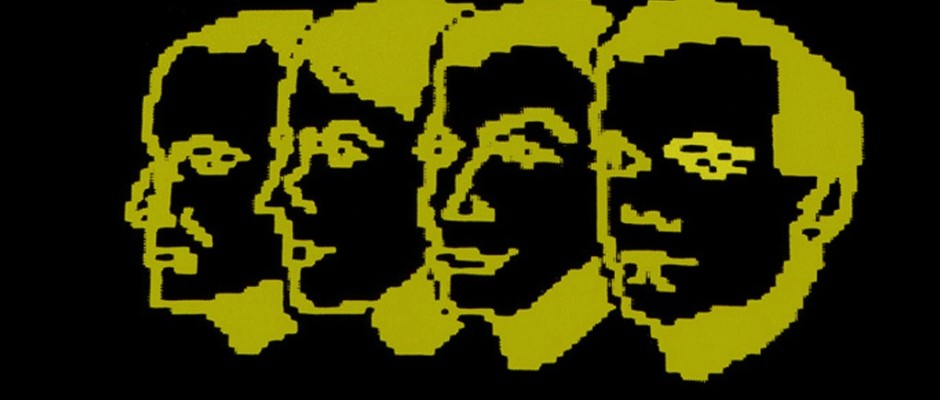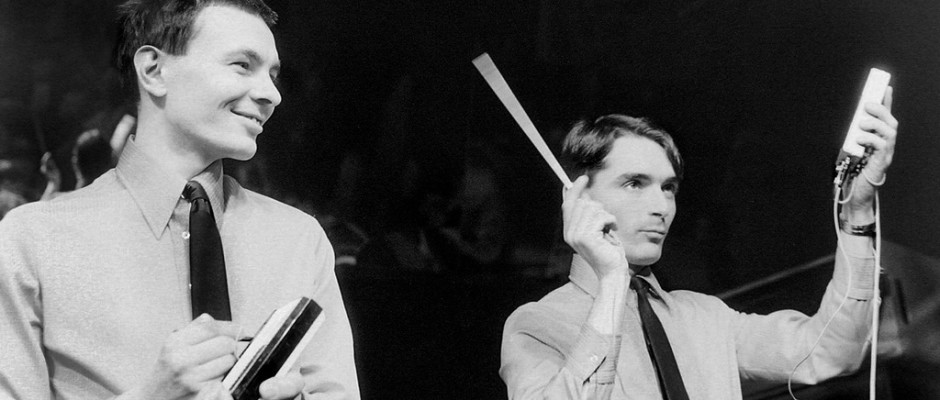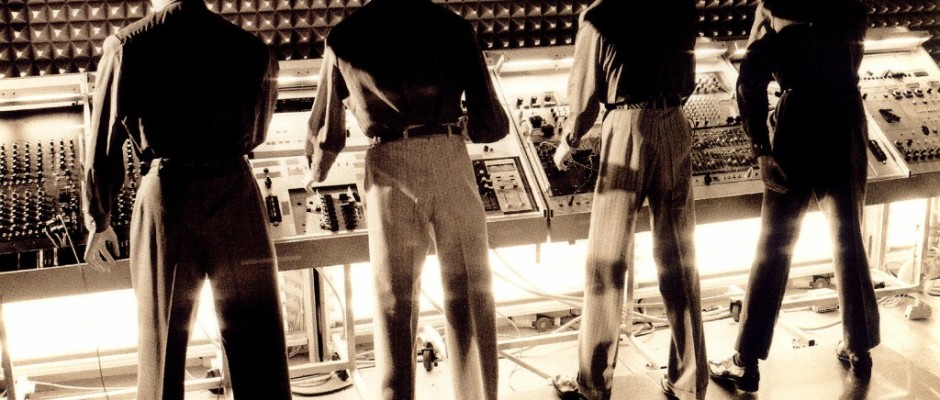- ITALIANO
- ENGLISH VERSION
L’album più concettuale, più cinico e, forse, più politico dei Kraftwerk. “Computer World” (1981) è il fortunato seguito di “The Man•Machine” (1978). Nell’arco di tre anni, il quartetto di Düsseldorf ha sperimentato suoni e modificato il proprio equipaggiamento, per un Kling Klang Studio ancora più all’avanguardia e, soprattutto, reso perfettamente smontabile per eventuali performance in giro per il mondo, in preda a un’autentica rivoluzione tecnologica.
La fine degli anni Settanta coincide con l’avvento dei computer, dell’informatica, di software. Nuove ossessioni per infezioni digitali. Le sette tracce a cura di Ralf Hütter, Florian Schneider e Karl Bartos il culmine di una loro riflessione in note sul futuro, probabilmente destinato ad essere attraversato da un certo senso di claustrofobia al limite della paranoia. Generato o diffuso dall’utilizzo dei nuovi mezzi in mano agli apparati di controllo o di repressione.
Una vera e propria denuncia nei confronti di certi meccanismi della polizia, delle istituzioni finanziarie, che giungeva al culmine della loro rappresentazione della resa meccanica dell’uomo moderno, sublimato in un manichino robotizzato pronto a sostituire il musicista sul palco. Il successivo passo sembrava, però, sfuggire alla percezione quotidiana, perché la meccanizzazione mentale sarebbe stata più sottile e penetrante tra le permeabili pieghe della società.
 Il reale oltre il profetico. Lavorare a stretto contatto con programmi ed elaboratori era una felice prassi per i Kraftwerk. Le autostrade, le radi-azioni, i treni appartenevano al passato. Riproduzioni di successo di realtà vissute durante viaggi al centro dell’Europa e della sua identità. La nuova via da percorrere era la micro-tecnologia, a partire da quel famigerato piccolo traduttore della Texas Instruments in grado di fare calcoli ed emettere un suono artificiale ‘premendo un solo pulsante’.
Il reale oltre il profetico. Lavorare a stretto contatto con programmi ed elaboratori era una felice prassi per i Kraftwerk. Le autostrade, le radi-azioni, i treni appartenevano al passato. Riproduzioni di successo di realtà vissute durante viaggi al centro dell’Europa e della sua identità. La nuova via da percorrere era la micro-tecnologia, a partire da quel famigerato piccolo traduttore della Texas Instruments in grado di fare calcoli ed emettere un suono artificiale ‘premendo un solo pulsante’.
La copertina realizzata da Emil Schult è gialla e nera. Le teste dei quattro membri sono ricreate sul monitor di un computer, l’HZ-1500, videoterminale della statunitense Hazeltine Corporation, prodotto già nel 1977. Sul retro, i famosi manichini-robot alle rispettive console, pronti per l’azione. All’interno, ognuno indossa la sua tradizionale uniforme e ha in mano un differente strumento tascabile: una mini-tastiera, un mini-calcolatore, un piccolo stilofono e una mini-drumpad.
Il sogno dei pionieri informatici era la creazione di un mondo interconnesso, fondato sullo scambio di informazioni e animato da valori positivi, quello dei Kraftwerk era l’elaborazione di un prodotto sonoro dal carattere universale. Se tutti erano in grado di comprendere e fare proprio il nuovo linguaggio delle macchine, la band, senza più badare alle differenze linguistiche con album in tedesco o in inglese, era pronta a offrire il proprio contributo alla contemporaneità.
Interpol and Deutsche Bank, FBI and Scotland Yard / Business, numbers, money, people / Computer World
Interpol and Deutsche Bank, FBI and Scotland Yard / Time, travel, communication, entertainment / Computer World
 Nonostante citi istituzioni investigative internazionali, la colossale opener Computer World appare in linea con quanto accadeva allora nella Germania Ovest, sotto shock dopo l’attentato del 26 settembre 1980 all’Oktoberfest di Monaco. Tredici morti e oltre duecento feriti a causa della bomba fatta esplodere dallo studente neonazista Gundolf Köhler. Un episodio che mise in moto una macchina di controllo e di repressione nella mani delle autorità di polizia.
Nonostante citi istituzioni investigative internazionali, la colossale opener Computer World appare in linea con quanto accadeva allora nella Germania Ovest, sotto shock dopo l’attentato del 26 settembre 1980 all’Oktoberfest di Monaco. Tredici morti e oltre duecento feriti a causa della bomba fatta esplodere dallo studente neonazista Gundolf Köhler. Un episodio che mise in moto una macchina di controllo e di repressione nella mani delle autorità di polizia.
Era altrettanto da scongiurare il ritorno sulla scena dei terroristi della Rote Armee Fraktion (RAF), un gruppo di estrema sinistra che aveva esaurito la sua spinta eversiva dopo una dura repressione poliziesca, con vari arresti e gli ‘strani’ suicidi di Andreas Baader e Ulrike Meinhof, tra i membri più in vista, nelle carceri di sicurezza. Fu così che l’archivio centrale della polizia, il computerizzato Bundes Kriminalamt di Wiesbaden, alzò la posta in gioco, violando persino diritti individuali.
Dentro o fuori la Germania Ovest, divenne obbligatorio di esibire il passaporto, con immediata segnalazione al sistema informatico di Wiesbaden, alla stregua dell’incubo distopico descritto da George Orwell tra le pagine del suo best-seller, “1984” (1949). Una condizione stringente per i Kraftwerk, favorevoli a un utilizzo diverso dei computer, più creativo e affatto condizionato dal desiderio di contabilizzare continui flussi di denaro o controllare singole vite umane.
I’m the operator with my pocket calculator / I’m adding and subtracting / I’m controlling and composing / By pressing down a special key, it plays a little melody / I’m the operator with my pocket calculator
Il ronzio elettronico, una melodia di tre note, il vocoder. Less is more. All’impegnata title-track segue Pocket Calculator, destinata a sconvolgere le menti degli apripista della Detroit techno. Una traccia più avvolgente, leggera e gioiosa, già pubblicata come primo singolo in diverse versioni, con vocal persino in lingua italiana, giapponese o francese. L’amore del quartetto di Düsseldorf per le lingue è tale che anche la vibrante Numbers elenca numeri in più idiomi, tra cui russo e spagnolo.
 La sequenza è forse asettica, quasi gelida, ma la base caldissima, non a caso, presa in prestito da Afrika Bambaataa per la sua travolgente Planet Rock, una sorta di dichiarazione d’amore nei confronti dei Kraftwerk, perché include anche un sample di Trans-Europe Express. A sfumare, poi, Computer World 2, ripresa dell’opener. È il trionfo dei rumori elettronici prodotti ‘in casa’: ci sono quelli bianchi, del parlato, delle percussioni o gli altri modulati. La meccanica prima di tutto.
La sequenza è forse asettica, quasi gelida, ma la base caldissima, non a caso, presa in prestito da Afrika Bambaataa per la sua travolgente Planet Rock, una sorta di dichiarazione d’amore nei confronti dei Kraftwerk, perché include anche un sample di Trans-Europe Express. A sfumare, poi, Computer World 2, ripresa dell’opener. È il trionfo dei rumori elettronici prodotti ‘in casa’: ci sono quelli bianchi, del parlato, delle percussioni o gli altri modulati. La meccanica prima di tutto.
Computer love / Another lonely night / Stare at the TV screen / I don’t know what to do / I need a rendezvous / I call this number / For a data date / I don’t know what to do / I need a rendezvous / Computer love
Il rapporto tra uomini e macchine ritorna centrale in Computer Love, ma è snocciolato tramite una vena malinconica che Chris Martin dei Coldplay non s’è fatto sfuggire, imprimendola all’interno della hit Talk, il tutto dopo aver scritto un’accorata lettera a Ralf Hütter per richiedere l’utilizzo di un campione. Eppure anche la band tedesca ha preso in prestito frammenti realizzati da terzi, come nel caso della claustrofobica Home Computer, uno dei manifesti di “Computer World”.
I suoi primi cinque secondi sono stati tratti dallo Speak & Spell, un giochino educativo prodotto dalla Texas Instruments a partire dal 1978. Dopodiché, irrompono sintetizzatori e oscillatori a preconizzare l’avvento dell’house e della techno nell’arco di meno di un decennio. In conclusione, l’ironica e ritmata It’s More Fun To Compute, nient’altro che un gioco di parole in scia al classico ‘it’s more fun to compete’, una scritta visibile al termine di una partita con un vecchio flipper.
Il songwriting senza tempo di “The Man•Machine” e l’ampio respiro di “Trans-Europe Express” (1977) furono soppiantati da un funk irresistibile. “Il dj The Electrifying Mojo trasmetteva “Computer World” in radio al pari di un testo sacro, influenzando un’intera generazione di ascoltatori afro-americani, che avrebbero dato origine alla techno”, ricorda Carl Craig in un’intervista per Rolling Stone. “Era come il sound di James Brown, con un groove implacabile”.
The more conceptual, cynical and, perhaps, political Kraftwerk‘s album. “Computer World” (1981) is the lucky sequel of “The Man•Machine” (1978). Over three years, the quartet from Düsseldorf experienced sounds and changed its equipment, for a Kling Klang Studio even more at the forefront and, above all, made it perfectly dismantled for possible performances around the world, in the throes of an authentic technological revolution.
The end of the Seventies coincides with the advent of computer, informatics, software. New obsessions for digital infections. The seven tracks edited by Ralf Hütter, Florian Schneider and Karl Bartos the culmination of their reflection in notes on the future, probably bound to be crossed by a sense of claustrophobia at the limit of paranoia. Generated or disseminated by the use of new media in the hands of the control or repression apparatuses.
A genuine complaint against certain police mechanisms, financial institutions, that it reached the peak of their representation of the modern man’s mechanical performance, sublimated into a robotic mannequin ready to replace the musician on stage. The next step seemed, however, escape at the daily perception, because mental mechanization would be more subtle and penetrating between the permeable folds of that society.
 Real over prophetic. Working closely with programs and computers was an happy practice for Kraftwerk. The motorways, the radi-ations, the trains belonged to the past. Successful reproductions of reality experienced during trips to the center of Europe and its identity. The new way to forward was the micro-technology, from that infamous little translator from Texas Instruments able to do calculations and give off an artificial sound ‘touching only of button’.
Real over prophetic. Working closely with programs and computers was an happy practice for Kraftwerk. The motorways, the radi-ations, the trains belonged to the past. Successful reproductions of reality experienced during trips to the center of Europe and its identity. The new way to forward was the micro-technology, from that infamous little translator from Texas Instruments able to do calculations and give off an artificial sound ‘touching only of button’.
The cover made by Emil Schult is yellow and black. The heads of the four members are re-created on a computer monitor, the HZ-1500, a visual display unit of the US Hazeltine Corporation, produced already in 1977. On the back, the famous robot-mannequins at their consoles, ready for action. Inside, each of them is wearing its traditional uniform and holds a different pocket instrument: a mini-keyboard, a mini-computer, a small stylophone and a mini-drumpad.
The dream of informatics pioneers was the creation of an interconnected world, based on the exchange of information and animated by positive values, that of Kraftwerk was the development of a sound product with a universal character. If everyone was able to understand and learn the new language of the machines, the band, without looking after the language differences of albums in German or English, was ready to give its contribution to the contemporary.
Interpol and Deutsche Bank, FBI and Scotland Yard / Business, numbers, money, people / Computer World / Interpol and Deutsche Bank, FBI and Scotland Yard / Time, travel, communication, entertainment / Computer World
 Despite mention international investigative institutions, the colossal opener Computer World is in line with what was happening then in West Germany, shocked after the attack of September 26th, 1980 at Munich Oktoberfest. Thirteen dead and more than two hundred injured after the bomb detonated by neo-nazi student Gundolf Köhler. An episode that set in motion a control and repression machine in the hands of the police authorities.
Despite mention international investigative institutions, the colossal opener Computer World is in line with what was happening then in West Germany, shocked after the attack of September 26th, 1980 at Munich Oktoberfest. Thirteen dead and more than two hundred injured after the bomb detonated by neo-nazi student Gundolf Köhler. An episode that set in motion a control and repression machine in the hands of the police authorities.
It was just enough to prevent the return on the scene of the terrorist Red Army Faction (RAF), a left-wing group that had exhausted its subversive push after a hard police repression, with several arrests and ‘strange’ suicides of Andreas Baader and Ulrike Meinhof, one of the most prominent members, in security prisons. So the central police archive, the computerized Wiesbaden’s Bundes Kriminalamt, raised the stakes, even violating individual rights.
In or out of West Germany, it became mandatory showing the passport, with immediate reporting to the computerized system of Wiesbaden, like the dystopian nightmare described by George Orwell between the pages of his best-selling book, “1984” (1949). A stringent condition for Kraftwerk, in favor of a different use of the computer, more creative and not influenced by the desire to record continuous flows of money or to control individual lives.
I’m the operator with my pocket calculator / I’m adding and subtracting / I’m controlling and composing / By pressing down a special key, it plays a little melody / I’m the operator with my pocket calculator
The electronic hum, a three notes tune, the vocoder. Less is more. After politicized title-track follows Pocket Calculator, designed to upset the minds of Detroit techno trailblazers. A track more enveloping, light and joyful, already released as the first single in several versions, with vocal even in Italian, Japanese and French. The love of Düsseldorf quartet for languages makes the vibrant Numbers rattles off numbers in more languages, including Russian and Spanish.
 The sequence is perhaps aseptic, almost cold, but the base is hot, not surprisingly, borrowed from Afrika Bambaataa for its passionate Planet Rock, a sort of love declaration for Kraftwerk’s art, because it also includes a sample from Trans-Europe Express. In the queue, then, Computer World 2, an opener recovery. It is the triumph of electronic noises produced ‘at home’: there are white, speech, percussion ones or other modulated. The mechanics first.
The sequence is perhaps aseptic, almost cold, but the base is hot, not surprisingly, borrowed from Afrika Bambaataa for its passionate Planet Rock, a sort of love declaration for Kraftwerk’s art, because it also includes a sample from Trans-Europe Express. In the queue, then, Computer World 2, an opener recovery. It is the triumph of electronic noises produced ‘at home’: there are white, speech, percussion ones or other modulated. The mechanics first.
Computer love / Another lonely night / Stare at the TV screen / I don’t know what to do / I need a rendezvous / I call this number / For a data date / I don’t know what to do / I need a rendezvous / Computer love
The relationship between man and machine returns central in Computer Love, but it is described with a melancholy vein that enjoy Chris Martin from Coldplay, who decided to catch it inside the hit Talk, after writing a heartfelt letter to Ralf Hütter to require the use of a sample. Nevertheless even the German band has borrowed fragments made by third parties, as in the case of claustrophobic Home Computer, one of the most impressive tracks of “Computer World”.
Its first five seconds were taken from the Speak & Spell, a play educational produced by Texas Instruments since 1978. Then, burst synthesizers and oscillators to advocate the advent of house and techno in the space of less than a decade. In conclusion, the ironic and upbeat It’s More Fun To Compute, nothing more than a word pun in the wake of the classic ‘it’s more fun to compete’, a written visible at the end of a game with an old pinball machine.
The timeless songwriting of “The Man•Machine” and the wide breath of “Trans-Europe Express” (1977) were displaced by an irresistible funk. “The Electrifying Mojo dj played Computer World like a sacred text to his FM audiences, influencing an entire generation of African-American listeners who would go on to create techno”, recalls Carl Craig inside an interview for Rolling Stone. “Black people could relate to it because it was like James Brown with a relentless groove”.



